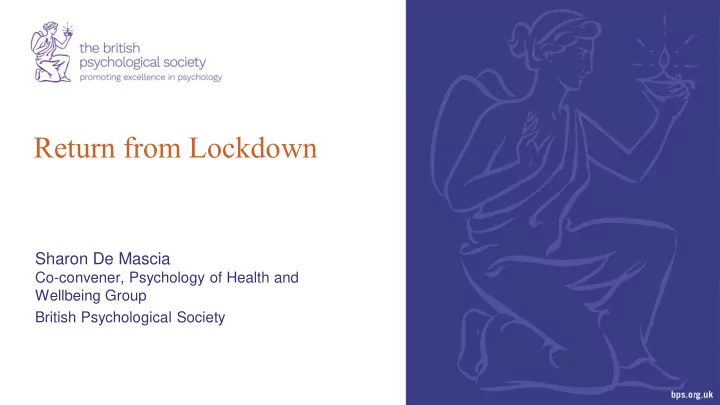

Return from Lockdown Sharon De Mascia Co-convener, Psychology of Health and Wellbeing Group British Psychological Society 1
What Emotions Have We Been Experiencing? 2
What Do Returners Need? To look after their mental health, those returning to the workplace need: • Physical and psychological safety • Support from their line manager • People focused leaders • Support in looking after their mental wellbeing • Help to feel connected with colleagues Some people may not want to return to work, which will increase their vulnerability to mental health issues 3
The Impact of Self Isolating • Adults in locations with higher levels of • The main psychological impact to date is the virus experienced lower mental elevated rates of stress or anxiety. But levels health of loneliness, depression, harmful alcohol and drug use, and self-harm or suicidal behaviour • Adults with existing health conditions had are also expected to rise. (World Health an increased risk of lowered mental Organisation 2020) health during lockdown • US people 8 times more likely to meet the • Adults who had stopped working at criteria for moderate to serious mental illness, higher risk of harm to their mental health. compared with 2018. (Twenge & Joiner ,2020) • (Rauch & Zhang 2020) 4
The Impact of Self-Isolating and Implications for Work • Just one month of confinement can • The World Health Organization warned last week that coronavirus “may never go away” negatively impact physical and mental health. (Rauch & Zhang 2020) and predicted a global mental health crisis caused by the pandemic was looming. BPS • Italian survey reveals 80% of people view also need support to cope with impact of coronavirus crisis • There have been suicides related to the covid 19 situation (BRF ONLUS) • Even though freedoms have been restored many people chose to stay indoors 5
The Impact of Recovery from covid 19 and Implications for Work Some reactions to recovering from covid 19: • Anxiety/Low mood What do we know about people • Fear of further illness and hyper-vigilance to recovering from covid 19?: bodily symptoms • Some people recover with no mental • Nightmares or flashbacks health issues • Poor sleep • Those who face the greatest • Impaired memory functioning disadvantages in life also face the greatest risk to their mental health. • Effects on attention, mental processing speed Mental Health Foundation (2020) and executive function • Fear of stigma or of contaminating others (BPS 2020) 6
Post Covid Considerations for a Return to Work • Traumatic realisation of loss • Survivor syndrome • Mistrust of colleagues • Hidden grief • Potential resentment of homeworkers • Stress and exhaustion of those who continued to work • Taking trauma related work home (BPS paper soon) 7
What do Managers Need to do? • Open a dialogue with staff about what • Be vigilant for any signs that staff may be they need in order to feel comfortable struggling returning to work • Keep reminding staff of the support available • Be open and honest internally and externally • Be very visible and build trust • Be flexible with working hours • Be empathetic and encourage staff to • Focus on wellbeing not productivity talk about how they feel • Be extra vigilant about vulnerable staff • Help staff connect and socialise in a safe • Maintain their own wellbeing way • Remember that staff members are individuals and will respond to covid in different ways 8
What Do Health and Safety Practitioners Need to do? • Implement regular wellbeing audits to • Collaborate with leaders and staff to identify broad psychosocial risks and implement wellbeing strategies that will work take a proactive approach to facilitating • Be extra vigilant around safety critical roles high levels of mental wellbeing. e.g. drivers, pilots etc. • Encourage managers and leaders to play their roles in managing psychological risk and wellbeing. • Keep emphasising the increased importance of preventative measures. • Help reassure staff that their safety is paramount 9
What do Occupational Psychologists Need to do? • Design wellbeing audit tools and help • Train staff and managers to manage staff organisations implement proactive mental wellbeing wellbeing • Help organisations manage change • Help organisations identify and develop processes to minimise any negative impact the best wellbeing strategy for them on staff • Help organisations design work and jobs • Help organisations better understand the to maximise wellbeing and engagement psychological impact of covid 19. • Coach and Develop leaders to better • Carry out individual cognitive assessments to engage and support their workforce determine the level of impact covid may have had • Help organisations design supportive • Help struggling individuals manage post-covid and productive work cultures symptoms 10
Thank You Sharon De Mascia Co-convener, Psychology of Health and Wellbeing Group British Psychological Society Director Cognoscenti Business Psychologists Ltd sharon@cognoscenti.uk.com See BPS Coronavirus Guidance here: https://www.bps.org.uk/coronavirus-resources 11
Recommend
More recommend